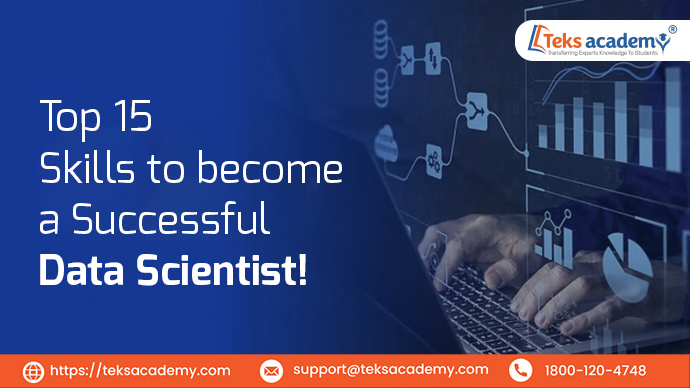Over the last five years, there has been a significant growth of data volumes. Companies have started realizing the importance of data. The demand for Data Science started growing in every sector. But to turn this data into relevant information, we need professional data scientists. Who need great skills in managing, analyzing and extracting insights.
But to become a successful data scientist is not as easy as it sounds. The best data science course in Hyderabad, will make you knowledgeful in relevant skills. You can acquire the set of skills that companies are looking for.
Who is a Data Scientist?
Data Scientist is analytics professional person who will:
- Collects the data.
- Analyzes the relevant data.
- Interprets the data.
By performing the above three-step procedure they make the perfect decisions. That will be helpful in the development of an organization. For this, they also involve the use of advanced analytics techniques. Such as machine learning and predictive modelling. Also some of the applications of scientific principles.
As part of data science initiatives, the data scientist will analyze things such as:
- Financial risks.
- Stock trades.
- Customer and market trends etc..
The data scientist role will combine several traditional and technical jobs. Such as:
- Mathematician.
- Statistician.
- Computer programmer, etc.
What are the responsibilities of a Data Scientist?
In organizations, the data scientist will play the lead role. They are commonly tasked in improving customer services and enabling effective marketing campaigns. They also make the better business decisions. For this, they analyze sets of quantitative and qualitative data. That depends on the needs of specific applications.
The basic responsibilities of a data scientist are as follows:
- Gathering relevant data that can be used in analytics applications.
- By using analytics tools, they predict the trends and patterns.
- Develop statistical models and machine learning algorithms to run against the data sets.
- Creates dashboards, data visualizations, and reports to communicate.
- Presents the results in a clear and informative manner.
Apart from this, some data scientists also develop AI technologies. For example: AI driven robots, autonomous machines, and self-driving cars.
What are the top 15 Skills to become a Data Scientist?
Mathematical Skills:
It is the basic skill that one data scientist should have. The strong mathematical skills will help in understanding and developing the trending algorithms. Along with these, they can also perform accurate data analysis. And also creates impressive models.
One must be proficient in linear algebra, calculus, and discrete mathematics. These mathematical concepts are foundational for:
- Machine learning algorithms.
- For optimizing the latest techniques.
- Analyzing the statistics.
Statistical Analysis:
To get started with data science, you don’t need any mathematical background. To become a skilled data scientist, you must be familiar with both mathematical and statistical concepts.
Statistical analysis is fundamental for finding and interpreting the data. It also integrates with understanding statistical tests, distributions, and regression models. Once the data scientist has become proficient in statistical analysis, then it can be helpful in:
- Making data-driven decisions.
- Increases reliability of their models.
- Gives accurate conclusions from data.
Programming Languages:
Learning programming languages is the fundamental skill every data scientist should acquire. Python and R are the basic programming languages. These will help data scientists to:
- Manipulate the data.
- Implement algorithms.
- Automated processes..
| Python | R |
| It is a versatile and mostly used programming language in data science. | As a powerful programming language mainly used for statistical analysis and data visualization. |
| Uses extensive libraries such as Pandas, NumPy, and TensorFlow etc. | Uses comprehensive libraries like ggplot2, dplyr, shiny and many. |
| With “Python” the data scientist can perform complex data tasks properly. And implement efficient machine learning algorithms. | With “R” the data scientist can conduct complex statistical analysis. And present the data in a simple format. |
SQL and Database Skills:
Structured Query Language – Understanding SQL is essential for data extraction. And also, manipulation from databases. It also includes:
- SQL will write the queries to retrieve and manipulate large datasets.
- It will combine the data from multiple tables and summarize it for analysis.
- Understands how to structure databases for fast and strong efficiency.
Database Management – These skills are important for storing and managing the data. The knowledge of database systems like MySQL, PostgreSQL, and MongoDB is essential. These will be helpful for the data scientist to:
- Handle the large datasets.
- Optimize the queries.
- Ensures the data integrity.
Data Wrangling:
Data wrangling is the process of cleaning, transforming, and organizing unstructured data. Makes them into a structured data. The libraries of Python and R will streamline this process. This will make it easier to derive meaningful insights from raw and messy data. The proficiency in data wrangling technique will allow data scientist to:
- Identify the missing values.
- Detect and correct the errors.
- Convert data into a consistent format.
Data Visualization Skills:
For representing the data in visual format, the data scientist will use tools like:
- Tableau.
- PowerBI.
- Matplotlib and,
- Seaborn.
These tools will be used in creating charts, graphs, maps and dashboards. Such that helpful in making the data easily understandable. For both technical and non-technical stakeholders. These data visualizations tools will allow data scientists to summarize thousands of data.
Machine Learning:
AI is the trending topic in data science. While machine learning is the branch of artificial intelligence. It is mainly focused on developing algorithms that will perform tasks efficiently. From Spotify to Instagram, machine learning is involved in your daily life.
Using machine learning, data scientists will build predictive models and algorithms. By using frameworks like TensorFlow, Scikit-Learn, and PyTorch. The machine learning skills will help in:
- Discovering the patterns.
- Predicting the outcomes.
- Automatically making the decisions.
- Enhancing the business strategies.
Big Data:
Big Data skills are essential for handling and analyzing large datasets. Data scientists should be proficient in technologies like Apache, Hadoop, and Spark. These will be helpful in storing, processing, and analyzing massive volumes of data.
The big data ecosystem will encompass largely growing tools and technologies. These are designed to perform large volume data in a quick, scalable, and reliable way. These big data skills will be helpful in:
- Uncovering insights.
- Optimizing data workflows.
- Deals with extensive and complex data sets.
- Supports the data-driven decision making in companies.
Deep Learning:
Deep learning is the subset of machine learning. It mainly focuses on many layers of neutral networks. It is used in tackling complex problems in:
- Image and speech recognition.
- Natural language processing.
- Autonomous systems.
The frameworks in deep learning are TensorFlow, PyTorch and etc. These will build, train, and optimize neutral networks. These skills will enable the data scientist to develop sophisticated models.
Natural Language Processing Skills:
Natural Language Processing (NLP) is the subset of artificial intelligence. It mainly focuses on extracting meaningful information. It is represented in natural language and text format.
In this data industry, NLP is on the rise. The NLP techniques based on machine learning and deep learning will power the applications like:
- Search engines.
- Chatbots.
- Recommendation systems.
The above-mentioned technical skills are crucial to become a top data scientist. But now-a-days technical skills alone are not at all sufficient. Not only technical, but non-technical skills are also important. So now let us discuss the top 5 non-technical skills. That will make you become the best data scientist.
| Non-Technical Skills | Significance |
| Problem-Solving | One must and should have the capability to identify and develop the solutions when required. The solutions must be in both creative and effective ways. Data scientists should have the capability of breaking down complex problems. |
| Communication skills | Strong communication skills are important in conveying technical insights effectively. Data scientists must convince their stockholders by creating compelling narratives. |
| Storytelling with data | The data scientist must be capable of telling an interesting story with data. This will attract customers and be helpful in an organization’s growth. |
| Collaboration and Teamwork | The projects in data science will often involve collaboration between data scientists, analysts, and business teams. One must have the ability in teamwork to collaborate with co-workers from other departments. |
| Time Management | The data scientist must have effective time management skills. One must be capable of prioritizing their tasks and managing several projects. |
Conclusion:
In 2025 if you wanted to rank as a top data scientist, then you must acquire both technical and non-technical skills. Above we have mentioned 15 most in-demand skills to become a professional data scientist. If you just want to improve your skill set, then start to learn the skills you are most interested in.






